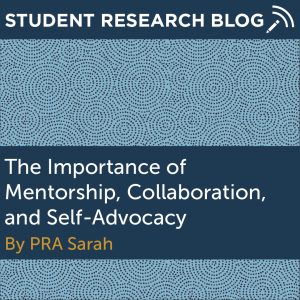By Sarah Tsuruo, OUR Peer Research Ambassador
 If you just joined a lab, or you’re stuck in your research growth and development, take a minute to read what I have to say about mentorship, collaboration and self-advocacy!
If you just joined a lab, or you’re stuck in your research growth and development, take a minute to read what I have to say about mentorship, collaboration and self-advocacy!
Mentorship
Mentorship as an undergraduate researcher is the most important thing to your success and growth. Mentors will teach you and guide you in every step of your research, from learning mechanisms, bench work, making your own project and writing an abstract or thesis. Mentors can be found not only in your PIs, but in all lab members: postdocs, PhD students, lab techs, and even upperclassmen undergrads. Being experts in their work, they have been through every success and downfall ― and know how to help you through it as well.
Maintaining mentor relationships is also very important, so make sure to keep contact and update them when needed. With that being said, don’t feel the need to only talk about research 24/7, your research mentors have a plethora of experiences you can learn from.
Collaboration
Collaboration is key to mentorship, success in research and accomplishing the goals you set for yourself. Especially as beginners in research, collaborating with others in your lab, department, field, and university brings a richer and deeper engagement in your work. So definitely don’t shy away from collaborating with others as it takes a village to complete successful research! Another essential aspect of collaboration is communication, so make sure to be transparent, active, and responsive when working with others on lab projects.
Self-Advocacy
Research PIs and lab members are all very busy and working away at their own goals. Therefore, as an undergrad, it’s up to you to advocate for yourself and look for opportunities to gain support from your PI/mentor. Self-advocacy also means speaking up for yourself, whether in lab meetings, in emails, or in the lab; speak up, ask questions and say what you’re thinking ― because that’s the only way you’ll learn and grow as a researcher.
Sarah is a senior majoring in Biological Sciences and minoring in Molecular & Cell Biology and Women’s, Gender, and Sexuality Studies. Click here to learn more about Sarah.